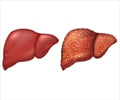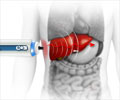New study reveals how a person's genes play a role in the possibility they'll have alcoholic cirrhosis.

‘Researchers hope to eventually find a way to identify FAF2 genetic factor in patients to help them prevent alcoholic cirrhosis in the future or develop targeted therapies that can help people in a more personalized way.’





Study Details - The genome-wide study began several years ago, and it is one of the most extensive studies associated with alcoholic cirrhosis ever performed.
- From over 1,700 patients, DNA samples from sites in the United States, several countries in Europe, and Australia were taken and sent to IU School of Medicine, where the team performed the DNA isolation for genome analysis.
- The patients were divided into two groups.
- 1st group consisted of heavy drinkers who never had a history of alcohol-induced liver injury or liver disease.
Advertisement
- FAF2 gene can make a person more likely to develop alcoholic cirrhosis.
Advertisement
- Alcoholic cirrhosis happens after years of drinking too much alcohol.
- In the U.S., the prevalence of alcohol-associated liver disease is on the rise.
"There's this convergence of findings now that are pointing to the genes involved in lipid droplet organization pathway, and that seems to be one of the biological reasonings of why certain people get liver disease and why certain people do not," said Tae-Hwi Schwantes-An, PhD, assistant research professor of medical and molecular genetics and the lead author of the study. ###
Source-Medindia















